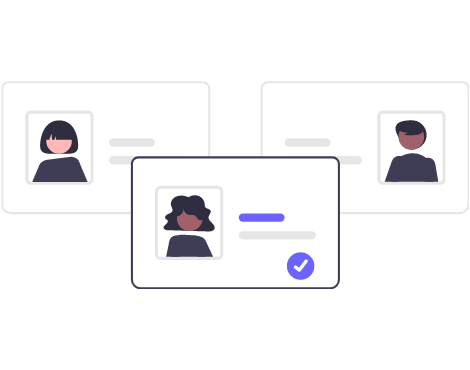We’re continuing our series of articles on the adaptation of contact center agents and sales managers. In the first part we talked about preliminary actions, in this one – about interviewing agents. This article is related to the tools for the manager.
Nuances in interviewing agents: How to improve
Offer the candidate a cup of tea, coffee, or water (especially in NON-mass hiring situations).
I’ve had a number of discussions about this, and the director of one contact center voiced his objection: “It looks like a cult where you’re luring people in, they would misunderstand.” But in my opinion, offering a person a cup of tea is perfectly acceptable. I’ve been using this simple tactic for about five years now, and not one candidate has mentioned this resembling a cult.
During agent interviews, I always try to first clarify the nature of the job to the candidate. Even in Moscow, not everyone has a clear understanding.
Here’s a scenario for contact centers:
– You’re likely a mobile subscriber, possibly a bank client, you have internet at home, right?
– Yes.
– Then most likely, there has been at least one situation in your life where you needed to contact the company that provides your service: the internet is down – you need to find out when it will be fixed; you need to check your bank account balance; you want to know how to activate or deactivate options from your cellular provider, right?
– Yes.
This “prelude” creates a clear context for the candidate: what could be clearer than calling your internet provider when your internet is disconnected? This script works well for any market segment that a contact center may serve.
After the candidate answers “Yes” twice, they’ll have a solid understanding of what I am talking about.”
He told him. This creates the necessary ground for continuing the conversation.
Option for Telephone Sales Departments
(Illustrating the general principle):
– The ultimate goal of the company is to sell our product/service. To sell, there needs to be a meeting with the decision maker. The manager’s task is to get a clear agreement on the phone from the person in charge for a meeting at a specific place and a specific date. If there is no agreement or the exact date/time of the meeting are not agreed upon, the meeting will not take place. For example, if you decided to meet a friend but did not decide on time and place, you would wait for each other for a long time, right?
– Right.
– The same principle applies here. We want you to get agreements for meetings at a specific place at an agreed upon time. How much do you NOT understand this task?
– I totally understand.
– Then may I ask how much do you NOT like such a job?
It is not necessary to use “negative” questions. “How much do you NOT like, NOT suitable, NOT satisfy, NOT meet your expectations”, but I believe that they allow to get valuable feedback from the candidate, reveal his doubts (and thus allow to work with them) and overall create an atmosphere of trust: no ambiguities are left.
To know more about working as an agent at the Oki-Toki site, you can watch here.
During and After the Interview with Agents
| The usual way things are done | How to improve the process |
| Candidates are given tests and tasks (which may appear odd to them) but aren’t explained why. | A fundamental aspect of adult learning: people need to understand the purpose of each task. Hence, it’s imperative to explain why each task is needed: ‘We’re going to test your conversational skills next. It’s a simple task. Ready?’ By not explaining the purpose, you run the risk of hearing feedback like ‘They asked such nonsense.’ |
| ‘We’ll call you back.’ | Decisions should be communicated immediately (finding grounds for rejection is not an issue). Candidates with positive outcomes should be informed about the commencement date of their training. Training should commence two working days after the interview at most: a longer waiting period kills the recruitment process. On average, the likelihood of a candidate starting training after waiting for more than three working days is less than 10%. |
| No company tour is conducted after a successful interview, or it’s organized by a recruiter. | The tour should be led by a current [senior] manager, a future mentor, or trainer. The tour plan and scripts must be approved by the CEO personally. It may seem like a distraction, but what could be more crucial than interacting with people? A new hire gets an opportunity to glimpse their future manager. It partially eases the fear of ‘Who are these people and how will they welcome me?’ Remember, recruitment costs are relatively high, but this process only takes about 5-7 minutes and it greatly elevates the newcomer’s trust in the organization. |
| The candidate doesn’t get introduced to the team. | When conducting an interview, I adopt this approach: ‘From experience, I know applicants often wonder if their salary payment will be delayed.’ (usually, applicants smile and nod at this point). ‘So, after the interview, if we come to an agreement, we’ll go on a little tour to the sales department/agents’ room. You’ll be able to point at any staff member and ask them any questions, including if their salaries are paid on time and according to the contract. Does this sound good?’ During the tour, we genuinely give the candidates an opportunity to ask questions. It’s a good sign if the candidate does this. But if they’re too shy to ask: ‘Colleagues, can we have a moment, please? We have a new person here for the interview, |
| The trainee meets the trainer at the beginning of the training. | Consider inviting one of the trainers to the agents’ interview for a short 1-2-minute introduction of themselves (this allays fears about who they will be dealing with: ‘They showed us the trainer, seems like a nice guy.’ This also illustrates the opportunity for progression if the trainer was ‘promoted’ from agent/manager). This trainer’s presentation script should be approved by management and learnt perfectly. If there’s no trainer available then a mentor, a senior manager, or a trainer can be invited for the self-presentation. It’s critically important! This only works if the trainer links their success with the organization’s success. It’s also critically important-2: the trainer must look not just good, but superb. Nuance: the recruiter and trainer should demonstrate clear mutual respect and the communication style adopted within the corporate culture. Lifehack: After the interview, we ask the trainer to describe the candidate’s profile verbally. This trains memory and attention: both are vital skills for managing a training group. |
| The applicants are made to observe the work of real agents/managers. Sometimes they are allowed to listen into live calls. | This isn’t recommended, especially for complex projects with massive information volume: it can trigger the objection ‘this is too complex, I won’t master it.’ In addition, there’s a risk of a non-disclosure agreement (NDA) violaiton if the applicant gains access to subscriber personal data and the company’s confidential information before signing it. A good practice is to record a short (up to 2 minutes) video showing a step-by-step (this is crucial) depiction of a manager’s work and presenting it during the interview. It should cover every detail: ‘This is how a client’s record is opened’, ‘This is the dialing process’, ‘After the subscriber answers, we say this and this,’ etc. Important: the call script in the video should clearly explain why certain things are done and said as shown, why specific expressions are used, and so on. |
| Applicants are left to handle document-related issues alone. | It’s better to have a concise printed set of instructions detailing, for example, how to request a forgotten Social Security number or how to find out your Tax ID number, as well as a dedicated workstation for resolving such and similar issues. In other words, an applicant should be able to request documents without leaving the office (this is especially true for those starting their first job). An added bonus here is the possibility to assess computer literacy. |
| Maximally, applicants leave the office carrying a brochure with them. | An applicant should take with them:
|
| If a group interview is being conducted, participants are let go simultaneously after it’s finished. | This is not recommended. A single toxic candidate, who didn’t like the conditions, can ‘ruin’ the entire group wholesale, for example, while they’re all in the elevator together. I let unsuitable people go immediately during an interview, as soon as I realize they haven’t passed certain selection criteria. The remaining ones leave one by one, I let them go in turns, giving different reasons, for instance, to clarify a document-related issue. Nuance: If two friends come for an interview, they have to leave together. That is, a situation where one is waiting long for the other should not happen. |



